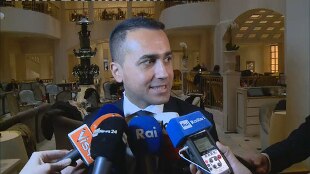Share
January 22, 2020 After weeks of indiscretions, this afternoon, during the presentation of the newly elected regional 'facilitators' in Rome, Luigi Di Maio should officially announce the resignation as political leader of the Movement. In the morning he will anticipate them to the 5-star ministers gathered at Palazzo Chigi.Di Maio's resignation, or step aside, would lead to a more collegial management of the movement. The new "facilitators" would make it possible to bring the movement to the general states, convened for mid-March, with a resigning leader. The Deputy Minister Giancarlo Cancelleri, the regional councilor Roberta Lombardi and the undersecretary Vito Crimi, who as the senior member of the Committee, are the favorite to inherit, at least up to the general states, the role of political leader. For the head of government delegation, the minister of justice Alfonso Bonafede or the economic development minister Stefano Patuanelli is mentioned.
The, for now only probable, Di Maio's resignation would come to five days from the Regionals in Calabria and Emilia Romagna, a repudiation of his own work, reason critics of this management of the movement reason. After two years and three months of driving the M5S, Di Maio's balance sheet is in deep red. The consensus has more than halved, as evidenced by the latest polls compared to the national elections of March 2018.
The political line of the movement has changed a lot since the elections. From the greater proximity to the right of the Conte 1 government, an alliance has been passed, from Di Maio never appreciated, with the PD and now the parliamentary groups that contest him even ask for membership in the reformist area. The defections increase, to the right and to the left.
Yesterday the Group left the Chamber Nadia Aprile and Michele Nitti, announcing the move to Mixed. The two could find refuge in the future formation of the ex minister Lorenzo Fioramonti, but not a few are afraid of new expulsions of the probivirs in the next few hours.
Just two months after the General States of the Movement, in Luigi Di Maio the temptation to stand in the window would prevail, to do as Alessandro di Battista did two years ago, to keep his hands free to think about his return, despite the responsibilities, merits and faults, which in these twenty-seven months of Maio had and Di Battista never.

